How many of these books have you read?
How many of these books have you read?
A plethora of academic and critical voices has addressed the Palestinian issue, employing diverse methodologies and epistemologies to elucidate the underlying factors driving the uprising.
Muslim countries and organisations naturally see ‘Palestine’ as a Muslim subject. The Palestinian uprising is held close to the hearts of the Muslim masses as a holy war.
But there are those who assess the plight of the Palestinians from a purely nationalistic, secular, and humanitarian perspective, as an unparalleled story of misery of a people forcibly and unjustly evicted from history and German lands.
There are those in Arab countries who approach the Palestinian issue as a problem of Arab nationalism only. The three approaches may differ in methodology, but they intersect on a human level, examining the same essential subject and subject matter.
Either way, Palestine is ultimately a human rights issue. This article highlights some prominent books that documented the heart-wrenching stories of Palestinian tragedy and Israeli brutality.
1. ‘After the Last Sky’ by Edward W. Said
Edward W. Said (1935-2003), an expatriate Palestinian intellectual, university teacher and author, wrote four major books on the Palestinian issue: The Question of Palestine, The End of the Peace Process: Oslo and After, The Politics of Dispossession, and After the Last Sky.
Edward Said, born in Jerusalem, was educated in Egypt and the United States. Said was a brave writer who exposed the evils of America and Israel while living in exile in America. He worked as a professor in the Department of Comparative Literature at Columbia University in the United States until his death in 2003.
Profoundly versed in Arabic, French and English, Said is renowned as the author of books on music, art, literature, culture and politics. Said’s articles and books have played a significant role in making the Palestinian issue an active topic of discussion at the academic, intellectual and political levels. In particular, he succeeded in publicly exposing the international community’s reactionary stance towards the Palestinian issue.
Edward Said began his intervention in public affairs by debunking the anti-Arab-Islamic propaganda carried out by the Western media in the context of the Arab-Israeli war. He called out to the world how Arabs and Muslims are portrayed in a distorted way by the Western media without even a thread connection with the truth. Orientalism, Culture and Imperialism, and Covering Islam are testaments to his rigorous and meticulous analytical skills.
Edward Said in his book ‘The Question of Palestine’ that Britain and America approached the Palestinian issue with racism. Pro-Israel supporters have historically hurled racial slurs against Arabs. The Zionists treatment of the Arabs parallels the Nazi Germany’s persecution of the Jews.
In reality, Arabs have never harmed Jews. Said asks how a Jew from Chicago may assert greater claims to Palestine than a Jerusalem-born Arab, highlighting disparities in citizenship, identity, and belonging. Laying out the facts, Edward Said asserted that American, British, and Jewish writers are unfairly vilifying the Palestinians. He unequivocally pointed out that Israel is doing a blatant ethnic war.
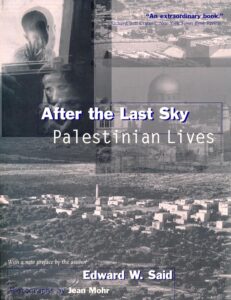
Edward Said’s ‘After the Last Sky’ presents a powerful visual critique of displacement, utilizing lyrical prose to convey the trauma, anguish, and resilience of uprooted communities. He reveals the conflicts, hopes, tolerance and homesickness of the Palestinians epitomised by the themes like ‘exile’, ‘alienation’, ‘return’ and ‘retention’. Photographs capturing the pain of exile bring the often overlooked Palestinian wounds directly before the reader’s eyes.
“Exile is a series of portraits without names or contexts” writes Said. Palestinian refugees scattered around the world underscore that exile is a denial of borders and identity. ‘After the Last Sky’ is a poem that takes shape with images and words. In this poetic language that resonates deeply, Said conveys the problems of the Palestinian exile. It is an inward perspective from within.
Although Syed casually shares memories of his childhood in his native land, the focus of the book is on the psychological and philosophical travails of a country and an entire people living in exile. Photographs for the book were taken by Jean Mohr.
2. ‘The Other Side of Israel’ by Susan Nathan
Susan Nathan is a British-born Israeli writer. After spending a short time in his father’s native South Africa, he returned to London and later took advantage of the Law of Return to settle in Tel Aviv. She realised that the Arabs in Israel were being subjected to severe neglect and abuse.
In this book, she delves into the historical and social roots of the political and cultural problems that plague the Middle East. She went to the homes of his Palestinian neighbours and saw firsthand the suffering they were going through.
Susan Nathan, who moved from Tel Aviv to the predominantly Arab city of Tamra, records what she saw and experienced in her book ‘The Other Side of Israel’. Nathan saw Palestinians in the West Bank and Gaza separated as second-class citizens by barbed wire fences. She has brought the heat and stress of daily Palestinian life into the book. She introduce Palestinian leaders who are fighting discrimination.
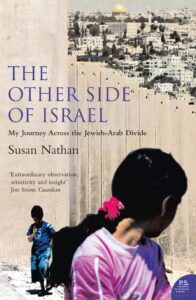
The book shows that there are many good Jews who want peace. But the Zionists are in power in Israel. The weapon used by the Zionists against the Palestinians is xenophobia, which is channelled through the Arabs. Susan Nathan’s wish is that the two communities should live like brothers, leaving aside prejudices and misunderstandings.
Tamra, a Palestinian enclave, offers a glimpse into a world largely invisible to Israelis. Nathan notes the absence of signage, reflecting the broader erasure of this Palestinian life from public consciousness. Mainstream media rarely covers their stories, leaving many Israelis unaware of the complexities of life on the other side.
Unlike neighboring Palestinian towns, Jewish settlements in the West Bank are typically well-planned and equipped with modern amenities, highlighting the disparities in infrastructure development. The Israeli state does not even consider Palestinians as human beings. Palestinians are denied even basic human rights.
Zionist settlers in Israel have dispossessed the Palestinians and occupied their homes. The Jews farmed the lands seized from the Arabs without any conscience and treated them as if they were their own. While the remaining Palestinians in Israel are crammed into a small space, Jewish immigrants are celebrating in a large space – for example, twenty-four thousand Arabs in the city of Sakhnin own two thousand five hundred acres of land.
At the same time, eighteen thousand Jews have fifty thousand acres of land in Misgav, which is located next to it. The Israeli government is building vacation homes and entertainment for wealthy Jews on lands seized from the Palestinians. All laws are against Arabs and Palestinians. This is the other side of Israel that Susan Nathan points out.
3. ‘Zionism: The Real Enemy of the Jews’ by Alan Hart
Alan Hart’s book ‘Zionism: the Real Enemy of Jews’ is a massive study spanning over twelve hundred pages in two volumes discussing two main themes.
One is how the modern Jewish state of Israel has become the enemy of Jews all over the world, the Middle East and the world itself. Another is the explosive situation that the Arab-Muslim world has reached.
Alan Hart asserts that Zionism is anti-human. He underlines the fact that Zionism and Judaism are not the same. The Jewish community consists of Israelis and Gentiles who believe in the Jewish religion. It is a religious belief based on belief in God, moral values and moral principles.
But Zionism is the idea of a Jewish state that emerged in 1897. The way of Zionism is terror based on racism. It grew through violence and destroyed all the values of Judaism. Alan Hart points out that the Zionists made a mockery of religious principles.
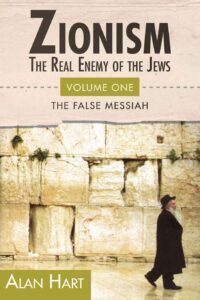
Zionism was opposed by sane Jews in its early days. Alan Hart testifies that many far-sighted people pointed out that Zionism was a great danger. What happened next is what they feared. The success of Zionism is due to the fact that they were able to convince the world of the myths they created. They made the people believe the lie that the Palestinian lands were historically theirs. In fact, there is no grain of truth in this.
Jews who immigrated to Israel from many parts of the world have no right to the land of Palestine. But the Zionists have succeeded in hiding this reality from the world’s attention. Only Jews who were born and raised in Palestine and who traditionally lived there could have rights there. Those Jews are Palestinians. They do not accept Zionism.
Another important fact that Alan Hart points out in his book is the dishonesty of the Zionist propaganda that the Arabs are a threat to the existence of Israel. The Zionists were able to stockpile as many weapons as possible, creating the impression that the Arabs might attack Israel at any moment.
The fact is that the Arab countries took the initiative to establish peace. Israel is not ready to negotiate. Neither the US nor the West understands that Israel does not value the democratic values that Western society upholds. It is only in the interest of the Zionists to keep the Middle East as a conflict zone. Zionism achieves its goals through propaganda.
In the first volume Alan Hart outlines how Western imperialism and Zionism go hand in hand. American Christian fundamentalism, like Zionism, abuses religion for political ends. The truth is that the Zionists do not hide their objectives.
In the second volume, Alan Hart exposes the fallacy of Israel’s claim that it has no equal in the Arab world to engage in peace talks. Alan Hart also analyses the double standards of America and Israel with absolute authority. He distinguishes between Zionist propaganda and historical truth.
4.‘The General’s Son: Journey of an Israeli in Palestine’ by Miko Peled
Miko peled is an Israeli-American activist, author, and karate instructor. His book ‘The General’s Son: Journey of an Israeli in Palestine’ is the story of Miko Peled, the grandson of Avraham Katz Nelson and the son of Matti Peled, the army general of Israel’s 1967 war against Egypt.
Miko Peled witnesses the later repentance of his father, who led the war for Israel. From an active Zionist, his father renounced the violent path of Zionism and became an advocate of Jewish-Arab cooperation and peace. This change affected Miko Peled.
Miko, who had to serve in the Israeli army (special forces), had a clear knowledge of what Israel was doing to the Palestinians. Miko reveals that he grew up hearing many myths about the Palestinians. At an early age, Miko, like any Jewish boy, saw Arabs and Palestinians as monsters. Miko soon realized that he was the enemy of those he knew nothing about. It was this realisation that motivated Miko to swim against the tide and work for peace.
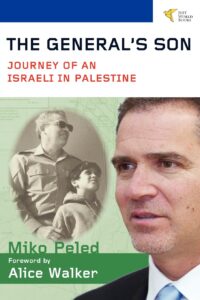
Miko had a personal reason to stand up for peace. In 1997, his niece was killed in a bomb attack. This tragic incident happened when Miko had finished his military service and was living a quiet life as a karate instructor in California. Miko was driven by the mind of her good-natured mother, who refused to live in a house that had been driven out and seized by a Palestinian family. Miko set out to get to know the people she had been trained to hate for no reason and to understand their hearts.
In California, he became acquainted with Palestinian peace activists. Initiatives were taken to organise medical aid for Palestinian children and wheelchairs for war-disabled people. Worked with volunteers. It was during this time that Miko learned firsthand the brutality of the Israeli regime, which prevented even medical care for Palestinian children.
In this book, Miko Peled, who went down to the interior of occupied Palestine, describes the sights he saw, the news he heard and the facts he learned. Miko remembers that the important people in the family forbade him to go there, telling him not to go there. The prohibition was based on the fear that the evil Palestinians would turn the Jew Miko on. Miko realised that the virus of fear was inside everyone and changing that is the prerequisite for peace.
This book is a must-read for anyone who wants to know how Palestinians are faring under Israel’s iron fist.
5. ‘My Father Was a Freedom Fighter: Gaza’s Untold Story’ by Ramzi Baroud
Ramzi Baroud is a Palestinian-American journalist and columnist who has worked as a mass communication lecturer at Curtin University, Australia, Aljazeera producer, and editor of the Palestine Chronicle. He is the author of ‘My Father Was a Freedom Fighter: Gaza’s Untold Story’, ‘The Last Earth: A Palestinian Story’, and ‘The Second Palestinian Intifada: A Chronicle of a People’s Struggle.’ He holds a PhD in Palestinian Studies from the University of Exeter
Gaza is always in the news. Located on the eastern bank of the Middle East, this Palestinian territory has always been a victim of Israeli atrocities. The Palestinian people are holding on to the Gaza Strip after suffering a lot. What is life like for the people there?
With the backdrop of his family story, Ramzi Baroud unveils the vivid images of how those who are constantly hunted, displaced, orphaned and widowed overcome the trials and make life black with ‘The Untold Story of Gaza’.
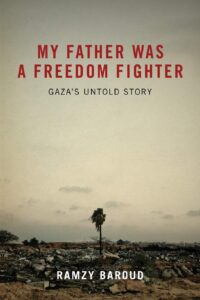
Ramzi Baroud tells the story of a generation that survived the genocide through endurance and struggle. In 1948, when Zionist terrorists massacred Palestinian villages, people took refuge in Gaza for their lives. It gave the impression that an entire country had been reduced to a town.
The author’s father is a freedom fighter who has been involved in the Palestinian tragedy (Nakba) since its inception. Speaking of his displaced family, Ramzi Baroud notes: “We saw the steel hands and oak skins of my grandfather as symbols of the decades of agricultural work carried out on Palestinian soil.”
This book has examples of how even when faced with the harsh realities of life, the humour hidden somewhere inside flows out to forget all the sorrows. Ramzi Baroud’s pen is able to convey the harsh realities faced by Palestinians to the entire world.





